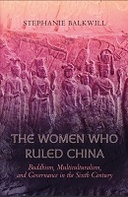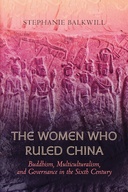Explore

In the late fifth century, a girl whose name has been forgotten by history was born at the edge of the Chinese empire. By the time of her death, she had transformed herself into Empress Dowager Ling, one of the most powerful politicians of her age and one of the first of many Buddhist women to wield incredible influence in dynastic East Asia. In this book, Stephanie Balkwill documents the Empress Dowager’s rise to power and life on the throne against the broader world of imperial China under the rule of the Northern Wei dynasty, a foreign people from Inner Asia who built their capital deep in the Chinese heartland.
Building on largely untapped Buddhist materials, Balkwill shows that the life and rule of the Empress Dowager is a larger story of the reinvention of religious, ethnic, and gender norms in a rapidly changing multicultural society. The Women Who Ruled China recovers the voices of those left out of the mainstream historical record, painting a compelling portrait of medieval Chinese society reinventing itself under the Empress Dowager’s leadership.
“This book is truly groundbreaking in its focus, theoretical contributions, and methodological innovations. Stephanie Balkwill’s deft treatment of Buddhism, gender, and ethnic difference in the Northern Wei court of Empress Dowager Ling will surely serve as a model for other scholars.” — Megan Bryson, author of Goddess on the Frontier: Religion, Ethnicity, and Gender in Southwest China
“Balkwill’s penetrating scholarship greatly enlarges our understanding of two often-ignored and deeply intertwined aspects of rulership in East Asia: women and Buddhism. This book explores the powerful role that women played in Northern Wei politics and how Buddhism provided a new repertoire for enlarging their roles, especially in the more populist forms favored by the Empress Dowager. A revealing, thought-provoking read.” — Andrew Chittick, author of The Jiankang Empire in Chinese and World History
This book is included in DOAB.
Why read this book? Have your say.
You must be logged in to comment.

